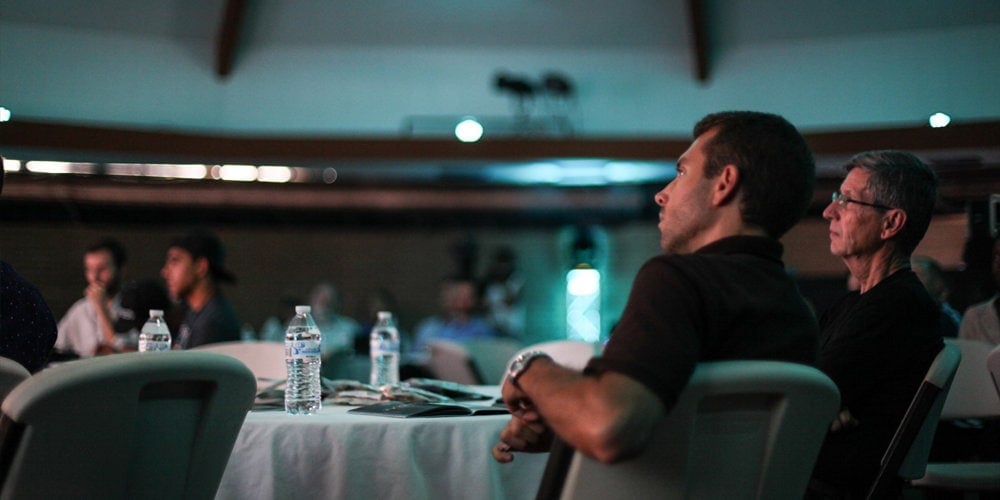
Highly successful Seventh-day Adventist entrepreneurs underscored Thursday that they had reached soaring heights in the business world by adopting a high work ethic that put God first.
Ruben Dias, an investor and founder of FastTrack.VC, which offers $1 million in seed investment to early stage technology companies, told the two-day Fruition Lab conference of young Adventist entrepreneurs in Phoenix, Arizona, that the old adage “cleanliness is next to godliness” was especially true in business.
“How is your room right now? If it is messy, you will probably have a messy investment,” Dias told attendees at the conference, which was held on the sidelines of the annual ASI convention.
Dias also advised young entrepreneurs to be able to tell their stories in a nutshell — “If you cannot tell your story in two minutes, you have to revise it” — and said physical exercise was an important part of the work day.
“I run an hour every day and see running as part of my work,” he said. “When I start running, I think, ‘What do I want to solve?’”
He said running helped his thinking process and he tried to resolve each problem by the time the run ended.
Dias and other presenters from an A-list of Adventist entrepreneurs draw frequent smiles, laughter, and enthusiastic applause from attendees on the final day of the conference at the Camelback Seventh-day Adventist Church. Participants, seated around tables in groups of eight, took notes as they listened and then crowded around the speakers to swap business cards and ask questions during break times.
This is the first-ever conference of young Adventist entrepreneurs.

Ed Zinke, a pastor and Bible scholar who cofounded Ann’s House of Nuts in the 1970s and built it into the largest manufacturer and marketer of trail mixes in North America, kicked off the conference on Thursday morning by sharing that he had flunked first grade as a missionary kid in Mexico.
“If I can make it, anyone can make it with God’s help,” Zinke said in an onstage interview with Bill Knott, editor of the Adventist Review, which is co-sponsoring the conference and will release the TED Talks-style presentations on its ARtv channel over the coming weeks.
Zinke said he and his wife, Ann, started Ann’s House of Nuts by selling nuts out of a car trunk at the headquarters of the General Conference of Seventh-day Adventists in Maryland. They decided from the start to offer top quality at the best prices — and make sure that their products reflected their personal values as Adventists.
“Our brand represented who we were,” Zinke said.
Danny Houghton, cofounder of British Columbia-based Vibrant Health Products, told how the adoption of three Bible passages in his own life had helped propel his company’s annual sales of organic breads, cereals and flour past the $10 million-mark last year.
Houghton said his food company — whose three subsidiaries are Silver Hills Sprouted Bakery; Little Northern Bakehouse; and One Degree Organic Foods, which allows customers to track ingredients directly to the farm — observes the seventh-day Sabbath by closing from sunset Friday to sunset Saturday.
“Commit your works to the Lord, and your thoughts will be established,” Houghton said, citing Proverbs 16:3.
He said the decision to close on Sabbath combined with day-to-day contacts with business partners and customers have provided many unexpected opportunities to share his faith.
“Through us [the Lord] diffuses the fragrance of His knowledge in every place,” he said, citing a second favorite Bible passage, 2 Corinthians 2:14.
Read also: Young Adventist Entrepreneurs Share Secrets for Success
Houghton said his wife was part of his third key Bible passage, Proverbs 31:10-11, which reads, “Who can find a virtuous wife? For her worth is far above rubies. The heart of her husband safely trusts her; so he will have no lack of gain.”
Houghton, who introduced his wife in the audience before he spoke, said the couple traveled together on business trips and her involvement and support was vital to the business.
Finding the right spouse is very important, said Garwin McNeilus, an inventor and legendary Adventist businessman perhaps best known for manufacturing concrete transport trucks and garbage collection vehicles in Dodge Center, Minnesota.
“I am fortunate. I never went home to a grumpy wife,” said McNeilus, who has been married for more than 50 years.
He said his wife leads by example.
“My wife always says, ‘Choose to be happy.’ That’s a choice,” he said.
McNeilus, looking back at his decades in business, said he had purposely decided to make the Lord’s work an integral part of his own work from the time that he invented a concrete mixer in 1976. He initially set aside $250 from each unit sold for church mission. When sales doubled, he increased the amount to $500.
“How can my work help toward finishing the [Lord’s] work?” he said in a challenge to attendees. “That’s what counts.”
Mike Parnell, retired chief executive of sunglasses maker Oakley and executive vice president of Red Digital Cinema, offered a list of tips that he has gleaned from his years in top management, including:
And Parnell’s personal favorite: A good plan executed is better than the perfect plan never executed.
Parnell cautioned young entrepreneurs that there was a right and a wrong reason to go into business for themselves. He said he recently spoke to a class of hopeful entrepreneurs at the University of California, Los Angeles, and had polled them about why they wanted to be entrepreneurs. He said he had been astounded to learn that 75 percent replied that they wanted to get filthy rich and retire early.
“This is the wrong reason to become an entrepreneur,” Parnell said. “Start by seeking God’s will.”